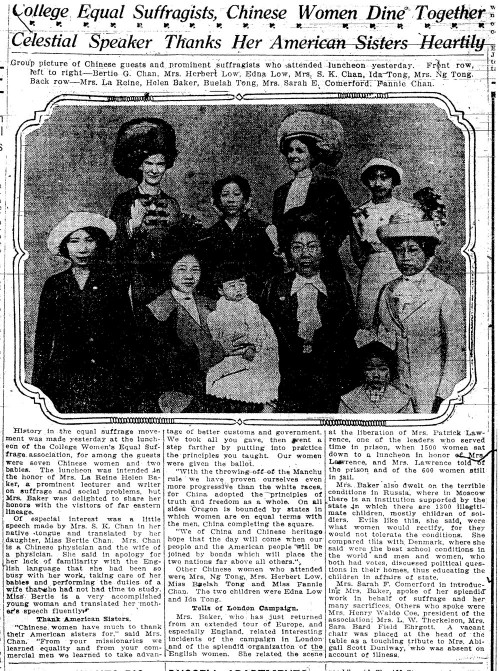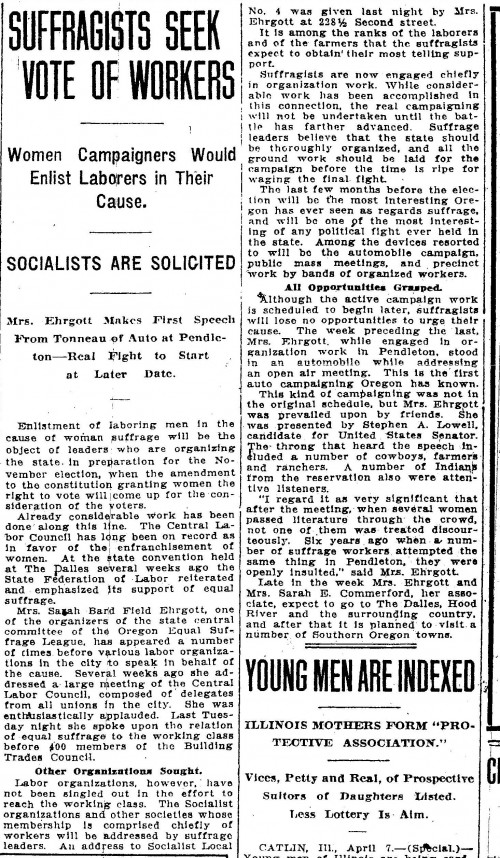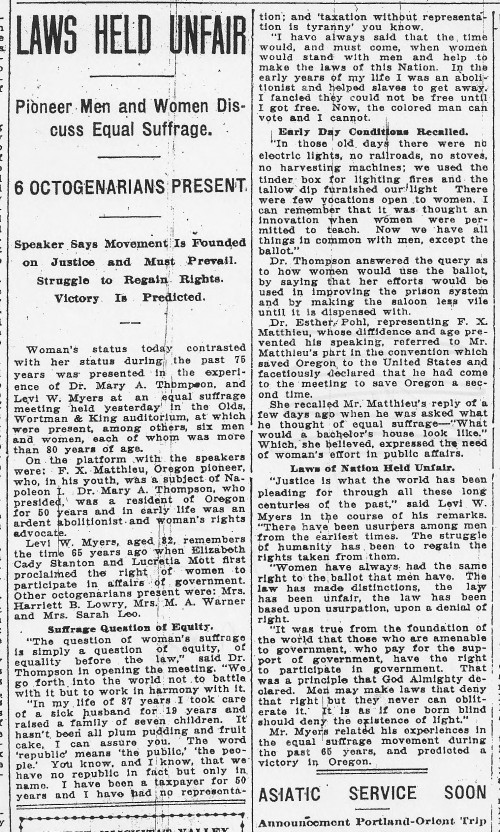"Chinese Women Dine With White Part 1 of 3," Oregonian, April 12, 1912, 16.

Transcription
Chinese Women Dine With White
Race Lines Not Drawn at Suffrage Banquet in Honor of La Reine Helen Baker.
Oriental Twits Sisters
Mrs. Chan Declares Oregon Is Behind Neighboring States and Nations – Militant Methods of English Workers Explained.Side by side with their Caucasian sisters, seven Portland Chinese women sat at a banquet at the Portland Hotel yesterday noon. The feast was attended by 150 equal suffrage workers. In the course of the banquet one of the Chinese women addressed the other women and voiced her belief in the rights of women to share political equality with man. She spoke in her native language, and her remarks were interpreted by her daughter.
The dinner was given in honor of La Reine Helen Baker, a magazine writer and author who is visiting in the city. The writer graciously stepped aside when interests centered in the Chinese women.
The presence of the Chinese women at a banquet with white women is unique. Mrs. Baker, who had just returned from a tour of two years in foreign countries, of which she spent six months in England in close association with the suffragists, said after the dinner that in all her travels she had observed nothing to compare with the Portland mixed dinner.
Portland Beats England
“In England,” she said, “where class distinction is virtually eliminated among the suffragists, and the possessor of millions associated with the poorest woman of the slums, I have never known the lines to be so completely obliterated that Chinese women and English women participated in the social function.”The Chinese women attending the banquet were Mrs. S. K. Chan, wife of a Chinese physician, and herself a physician; her two daughters, Bertie and Fannie Chan; Mrs. Tong, with her two daughters, Ida and Beulah Tong, and Mrs. Herbert Low. Mrs. Chan is the president of a local equal suffrage society among the Chinese women. White suffragists yesterday learned for the first time of the existence of such an organization in the Chinese quarter. Mrs. Chan addressed her white sisters in her native language, and her words were interpreted by her daughter, Bertie, who speaks fluent English.
Thanks Due Americans.
“We Chinese women have much to be thankful for toward our American neighbors,” said Mrs. Chin, “You sent your missionaries to our country and they told us about the destiny and the equality of man and held up before us the highest of ideals. You opened up the avenues of commerce our closed confines and made it possible for our people to get in touch with the outside world, and by observing the various customs and peoples there, to better our customs and our government. But we have taken one step ahead of you. You have brought us the truths of the rights of man and we have put them into practice by granting our women the ballot, thereby placing them upon an equality with men, while you are yet trying to convince your men of this right.“In this way the Chinese have shown themselves more progressive than the whites. When they threw off the yoke of Manchu tyranny and of the old vogue, they threw it off completely and adopted in their entirety the principles of truth and freedom.
Some Hope for Oregon.
“Oregon is now bounded on four sides by states that have recognized the rights of women. On the north there is Washington, on the east there is Idaho, on the south there is California, and far away, across the waters on the west, there is China. I hope the time is not far off when Oregon herself will take her place among them.”The speech was enthusiastically applauded and her good-natured twitting of the Oregon women on their position outside the ranks of suffrage governments occasioned much merriment. All of the Chinese women were dressed in smart, conventional American gowns.
Mrs. Baker, in her address, touched on the work of the suffragists of England and said that they were much misunderstood. She outlined the causes that compelled English women to resort to militant methods and denied the charge that there were two factions of suffragists in England. They are highly organized, she said, and work together, in a spirit of harmony. Violence, she said, is employed only as a last resort.
Mrs. Coe Presides.
Mrs. Henry Waldo Coe, president of the National College Equal Suffrage League, under the auspices of which the banquet was given, presided as hostess.Yellow jonquils and intertwined suffrage and American flags decorated the tables and the room.
Mrs. Sarah E. Comerford introduced Mrs. Baker.Mrs. L. W. Therkelsen, who has just returned from California, delivered a message of greeting from the women of California, and recounted her observations of equal suffrage put into practice in that state. The aims and workings of the National College Equal Suffrage League were explained by Mrs. Sara Bard Field Ehrgott.
A touching tribute was paid to Mrs. Abigail Scott Duniway, president of the Oregon State Equal Suffrage Association, who, through illness, was unable to be present. A vacant chair was placed at the head of the table in honor of Mrs. Duniway, and Dr. Coe paid a high tribute to the absent worker.
The following women were present at the banquet:
La Reine Helen Baker, Mrs. Sarah E. Comerford, Mrs. C Edward Grelle, Mrs. Paree Gibbon Rountree, Mrs. Le Roy Parker, Mrs. W. R. King, Mrs. R. R. Hoge, Mrs. Robert G. Dieck, Mrs. F. W. Blumauer, Miss A. Hunt, Mrs. Franklin N. Hertz, Mrs. C. H. Hepburn, Mrs. Rose Campbell, Mrs. Henry Waldo Coe, Mrs. J. Andre Fouilhoux, Mrs. Solomon Hirsch, Dr. Kittie P. Gray, Dr. Mary V. Madigan, Mrs. H. Ogden, Miss Elizabeth Cadwell, Mrs. Ben Selling, Mrs. Sarah Bard Field Ehrgott, Mary Frances Isom, Mrs. C. B. Woodruff, Miss Laura Northup, Dr. Marie D. Equi, Mrs. R. Robertson, Dr. Clara I. Darr, Dr. Mae Cardwell, Miss Emma Wold, Mrs. Emma Wilson Gillespie, Miss Anne H. Shogren, Mrs. B. Grelle, Mrs. John H. Cronan, Mrs. Emma B. Carroll, Miss Hazel Weidler, Mrs. L. W. Therkelsen, Miss H. L. Seeley, Miss Emma Buckman, Mrs. A. A. Morrison, Mrs. Fred Strong, Mrs. P. Herring, Mrs. Genevieve Thompson, Mrs. C. Wood, Miss Helen Eastham, Mrs. Morris H. Whitehouse, Miss E. Prichard, Mrs. Margaret Hoge, Mrs. E. T. Taggart, Dr. Mabel Akin, Mrs. J. C. Elliott King, Mrs. Henry Jones, Mrs. A. Bomberg, Mrs. J. W. Ross, Miss Cornella Cook, Mrs. J. L. McCown, Mrs. Robert H. Strong, Dr. Esther Pohl, Mrs. W. L. Finley, Miss Elizabeth Griebel, Miss A. Shogren, Mrs. A. E. Clark, Mrs. Stanley G. Jewett, Miss Marion Jackson, Mrs. M. L. T. Hidden, Miss Hazel Therkelsen, Mrs. John F. Logan, Miss Frances Gotshall, Miss Rhoda D. Failing, Mrs. C. G. Klingenberg, Mrs. Robert Forbes, Mrs. Henrietta Eliot, Mrs. David Shindler, Miss Alice Strong, Mrs. A. A. Lindsley, Mrs. P. F. Jones, Mrs. B. Pileter, Mrs. A. King Wilson, Mrs. E. E. Heckbert, Mrs. George A. Kyle, Mrs. H. W. Williamson, Mrs. J. M. Morton, Miss A. Block, Mrs. C. E. Groesbeck, Mrs. L. James, Mrs. R. C. French, Mrs. Frank Kerr, Mrs. Helen Ladd Corbett, Mrs. George B. Van Waters, Mrs. H. Reynolds, Miss Sally Lewis, Miss Pearl Kendall, Mrs. Charles Gauld, Mrs. Maud Crawford, Mrs. Robert H. Tate, Mrs. Holt C. Wilson, Dr. Florence Manion.
1912 April Permalink





